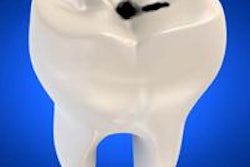
Add another virtue to the list of xylitol's benefits: Mothers who use it will reduce the risk of their children developing caries over the long term. Finnish researchers reported the striking findings after circling back with the participants of a maternal caries prevention study they had completed 10 years ago.
"We wanted to study if the avoiding of early mutans streptococci colonization had long-term effects," lead researcher Marja-Liisa Laitala, DDS, PhD, told DrBicuspid.com. "The most important result was that the first carious experience was delayed by over three years."
Dr. Laitala presented the research, which was conducted at the University of Turku, during a poster session at the International Association for Dental Research (IADR) meeting in San Diego last month.
— Marja-Liisa Laitala, DDS, PhD
The occurrence of caries in high-caries-risk children in the study actually dropped to the rate of the reference group, the researchers found.
The previous study compared the transmission rates of mutans streptococci from mother to child; in that study, maternal xylitol use proved to be more effective than chlorhexidine and fluoride varnish treatments.
"Mutans streptococci are principally transmitted from mother to child in saliva contacts," Dr. Laitala explained. "The maternal use of xylitol inhibited this transmission."
The mothers, who had been screened for high saliva mutans streptococci levels, were randomly assigned to three groups. The intervention group chewed gum with 5-gram doses of xylitol three times a day when their children were between 3 months and 24 months old. Two control groups received biannual fluoride or chlorhexidine varnish treatments.
In the new study, Dr. Laitala's team followed up with the children from the previous study until they were 10 years of age using records from the Ylivieska Public Health Center. Of the 195 participating children, 148 were still available. Mothers with a low level of mutans streptococci served as a reference group.
Decay was measured with the decayed, missing, and filled teeth (DMFT) index, and caries-free time was estimated with the Cox regression model. The caries-free period in primary teeth was longest for xylitol: 8.17 years in the xylitol group, 5 years with fluoride, 6.5 years with chlorhexidine, and 8.14 in the reference group.
"The remarkable difference in caries-free time was a significant and surprising finding," Dr. Laitala said. "There was over a three-and-a-half-year delay in the occurrence of caries in high-caries-risk children -- we got it to the same level as the children who were not at high caries risk."
This is good news for new parents, she noted. They can easily help prevent caries in their children simply by regularly chewing gum with xylitol.
"Dentists in Finland recommend regular xylitol usage for the parents of little children when the first primary teeth of their baby are erupting," Dr. Laitala said. "Xylitol use of the parents helps their children to avoid caries, pain, and inconvenience, and thus raises the quality of life."



















